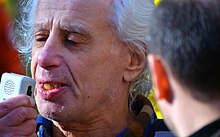Viktor Fainberg
| Viktor Isaakovich Fainberg | |
|---|---|

Fainberg in Paris
|
|
| Native name | Виктор Исаакович Файнберг |
| Born |
November 26, 1931 Kharkiv, Ukrainian SSR |
| Nationality | Ukrainian Jew |
| Citizenship | Russia, France |
| Education | philology of the English language and literature |
| Alma mater | the Leningrad University |
| Occupation | philology, politics |
| Known for | his participation in the dissident movement in the Soviet Union, the 1968 Red Square demonstration and the Campaign Against Psychiatric Abuse which led the struggle against political abuse of psychiatry in the Soviet Union |
| Movement | dissident movement in the Soviet Union |
| Partner(s) | Marina Voikhanskaya |
| Children | son Yuri |
| Parent(s) | Isaac Fainberg and Sarah Dashevskaya |
| Awards | Medal of the President of the Slovak republic |
Viktor Isaakovich Fainberg (Russian: Ви́ктор Исаа́кович Фа́йнберг, born 26 November 1931,Kharkiv, Ukrainian SSR) is a philologist, prominent figure of the dissident movement in the Soviet Union, participant of the 1968 Red Square demonstration, and the director of the Campaign Against Psychiatric Abuse.
Viktor Fainberg was born to the married couple of Isaac Fainberg and Sarah Dashevskaya. In his life as a child, while attending school during an antisemitic campaign of 1948-1952, he was subjected to harassment that, in his own words, he did not reconcile himself to, but entered the fray with an abuser. As the result of these frays, he got a referral to a psychiatrist.
In 1957, in connection with antisemitic insult, he had a fight with a policeman and for this reason was sentenced to 1 year of corrective labor.
In 1968, he graduated from the English unit of the philological department of the Leningrad University where he defended his diploma thesis about writer Salinger with distinction. In the summer of 1968, Fainberg worked as a guide for the Pavlovsk Palace.
Viktor Fainberg was one of the seven persons who participated in the 1968 Red Square demonstration against the intervention into Czechoslovakia. During the demonstration and his arrest, he lost many teeth and in this unpresentable state was never presented for trial; instead, he was placed to a psychiatric hospital.
Fainberg was examined by the Serbsky Institute commission composed of G.V. Morozov, D.R. Lunts and Y.L. Lindau. In their act No 35 / s dated October 10, 1968, they did not mention the invasion of Czechoslovakia, which gave rise to this demonstration, the action was merely described as ‘disorderly conduct at Red Square,’ and Fainberg’s mental condition was described as follows:
...
Wikipedia
